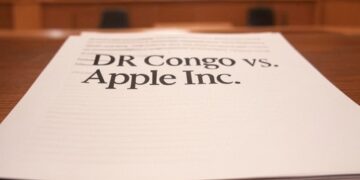The Democratic Republic of Congo (DRC) has filed lawsuits in France and Belgium against Apple Inc., alleging the company has benefited from minerals illegally mined in its conflict zones. The lawsuits claim that Apple knowingly used tin, tungsten, tantalum, and gold—key components in electronics—sourced from war-torn areas in the DRC.
The legal action highlights the ongoing exploitation of the DRC’s vast natural resources, which are often mined under conditions involving forced labor, child labor, and violence. Armed groups in the region have long profited from controlling mining operations, fueling conflict and undermining the country’s stability.
Apple, a global leader in technology, has denied the accusations, stating that the company conducts regular audits of its supply chain to ensure compliance with ethical sourcing standards. The tech giant has also pointed to its investments in programs aimed at reducing reliance on conflict minerals.
The case underscores the broader challenges multinational corporations face when sourcing raw materials from high-risk regions. Minerals originating in the DRC often pass through multiple intermediaries, making it difficult to trace their origin. Neighboring countries, such as Rwanda and Uganda, have also been accused of smuggling conflict minerals from the DRC and exporting them as their own.
This lawsuit raises critical questions about corporate responsibility and the enforcement of international human rights laws. The DRC’s legal team argues that companies like Apple must do more to ensure their supply chains are free of conflict minerals, particularly given their public commitments to sustainability and ethical practices.
If successful, the case could set a legal precedent for holding multinational corporations accountable for their role in perpetuating human rights abuses in resource-rich developing countries.













